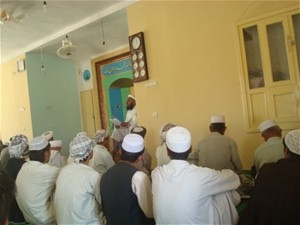Home » Reports & Data » Progress » Transforming Lives » Religious Leaders Promote Healthcare for Families

Mullahs learned how to improve family health in accordance with the Holy Koran.
USAID/COMPRI-A
1.8 million Afghans learned about good health practices and family planning at their local mosques.
10 DECEMBER 2009 | KABUL, AFGHANISTAN
Afghanistan’s infant, child, and maternal mortality rates are among the world’s highest. Cultural taboos surrounding family planning, as well as a lack of education about effective healthcare for mothers and children, have led to this public health challenge. Throughout the country, there is an acute need to raise awareness about products and practices that keep mothers, children, and families healthy.
Recognizing that community religious leaders in Afghanistan are among the most important and trusted providers of public education, USAID partnered with imams and mullahs to improve the health of women and children. In 2008, USAID trained 288 religious leaders in 10 provinces to provide accurate, accessible information about preventative healthcare, family planning, and using health products like water purification tablets.
During religious services, the imams and mullahs incorporated vital health messages into their sermons, teaching about child and maternal health in accordance with the Holy Koran. This innovative, culturally sensitive approach reached an estimated 1.8 million Afghans.
The health messages were supported by the distribution of more than 200,000 leaflets explaining the benefits of health products like oral rehydration salts and family planning practices like spacing the birth of children. Radio spots on local and national stations also bolstered the public awareness campaign.
In most provinces, Afghans who heard these messages found them persuasive and worth incorporating into their daily lives. Citizens reported that the teachings were well received because they were developed to comply with Islamic standards and were provided by respected community leaders.
The health messages communicated during Friday services, combined with other social marketing efforts, resulted in substantially better sales of health products at local pharmacies. For example, sales of USAID’s brand of oral rehydration salts, which are essential to helping young children recover from diarrhea, increased by a factor of 12 in 2008. Family planning products also saw increased sales. Efforts like these lead to well-informed, healthier families and help prevent the tragic loss of life in Afghanistan.







Comment
Make a general inquiry or suggest an improvement.